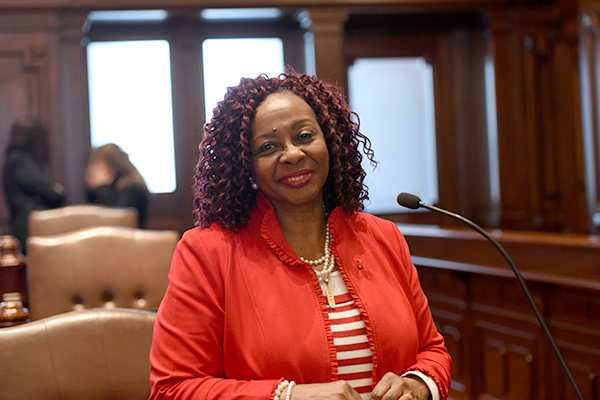Hunter continues to fight for wage hike for in-home care workers
- Details
- Category: Frontpage

“Home care aides provide valuable services that not everyone can handle or are willing to do,” said Hunter. “The tasks that come with their work load are difficult but much needed in this state. The individuals willing to serve in this profession deserve to be compensated with higher pay and health coverage.”
Currently, the average wage for home care aides through the Illinois Department on Aging’s (IDOA) Community Care Program is only $10.98 per hour. Senate Bill 3511 aims to increase that wage to $19.89 on July 1, 2018 and by $1 each year after that.
“Better wages and benefits would bring stability to a vital workforce that experiences high rates of burnout and turnover.” Hunter said. “Unfortunately, many of our skilled professionals leave the industry in search of better paying jobs. High turnover causes confusion and uncertainty in the lives of these seniors who rely on the workers for daily care and compassion.”
For seven years, the program rates have gone unchanged. As for the Workers that have chosen to stay in the field, many struggle with low wages falling further behind as cost-of-living continues to increase.
The legislation passed out of the Human Services Committee and will be called in the Illinois Senate for further consideration.
Hunter encourages organ donation during Donate Life Month
- Details
- Category: Frontpage

This 100th General Assembly, State Senator Mattie Hunter (D-Chicago) and Secretary of State Jesse White introduced new legislation that would allow 16- and 17-year-olds to register for the state’s First Person Consent Organ/Tissue Donor Registry when they receive their driver’s license or identification card.
Since the law went into effect, so far nearly 12,000 teens have registered to be donors in the state of Illinois.
“Organ donation is so important,” Hunter said. “Choosing to give life to another is a wonderful gift. Nearly 5,000 people are on the waitlist for organ or tissue donations, and about 300 people die each year because they aren’t able to get organ donation in time. Opening this donor registry has broadened the number of participants which will ultimately save countless lives.”
By joining the First Person Consent Organ/Tissue Donor Registry, 16- and 17-year-olds can give consent to donate their organs and tissue at the time of their death. However, the procurement organizations, Gift of Hope Organ and Tissue Network and Mid-America Transplant, are required to contact a parent or guardian to ensure approval of the donation. Ultimately, the parent or guardian will have the opportunity to overturn the child’s decision.
As for donors, their decision to register can turn a troubling time into a source of comfort for families as a result of renewed life for others. Please visit here for more information on how to become an organ donor in Illinois.
Senator Hunter: It is highly irresponsible of this administration to ignore the realities of gun violence
- Details
- Category: Frontpage
 State Senator Mattie Hunter (D-Chicago 3rd) issued the following statement today in response to Gov. Bruce Rauner’s veto of the Gun Dealer Licensing Act:
State Senator Mattie Hunter (D-Chicago 3rd) issued the following statement today in response to Gov. Bruce Rauner’s veto of the Gun Dealer Licensing Act:
“Gun violence continues to plague many communities across our state.
Gun violence is what took my two nephews away from me and my family during the summer of 2015. Gun violence is what left 17 families hopeless after their loved ones were murdered ruthlessly in the Florida mass shooting.
Gun violence is what threatens the streets of Chicago day in and day out. How many more people have to die before we enact critical gun reform legislation?
We have a public safety issue and this is a common sense solution. It is highly irresponsible of this administration to ignore the realities that plague our communities.
I urge Governor Rauner to put the people of this state first before partisan politics— Reconsider Governor.”
More Articles …
Page 102 of 143


